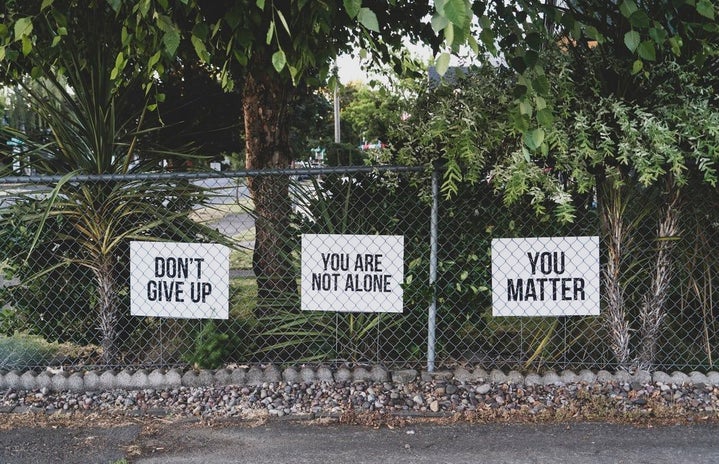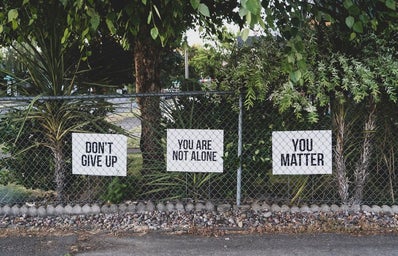September has been acknowledged as Suicide Awareness Month since 2008. Suicide is usually considered a “taboo” topic to talk about, but without awareness and prevention, how is there an expectation to be given that the crisis will improve? There’s no better way to learn more about suicide awareness than through someone who works with grief so often.
“I once had someone say to me “You only know what you know, and you can’t know what you don’t know.” If our youth and community don’t know about the resources available, they can’t know to seek them out. We need this awareness month as a designated suicide education period to spread awareness. “
Madison Hershberger, M.Ed, CCLS, is this person. Madison works at a not-for-profit called Brooke’s Place. When asked what Brooke’s Place was, Madison responded.
“Brooke’s Place is a community-based, not-for-profit organization, which provides free grief support to young people ages 3-29 years old and their parents and guardians. Brooke’s Place provides support groups, therapy services, and community education to empower children, teens, young adults, and their families to thrive in the midst of grief.”
Brooke’s Place provides the space for people of all different ages to come together and share the common experience of having a loved one die. From this, they can be offered support through the hard feelings that may come with grief. Madison’s position at Brooke’s Place is their volunteer coordinator for ongoing grief support groups.
“I work on the ongoing support group team to oversee and care for both volunteers and families, so I serve at four of our six program nights. I assist with the coordination and training of volunteers. I assist with enrollment and care of the families, and I create and implement a lot of the therapeutic brief activities for the program nights. I assist with volunteer training and kind of do anything and everything in between that is needed.”
Having been able to get to know Madison, suicide is very relevant in the work that she does at Brooke’s Place. The first question Madison was asked in the interview was how Suicide Awareness Month plays into Brooke’s Place.
“We see individuals who come to Brooks place for a multitude of reasons and a multitude of causes of deaths. And one of those is suicide, so we provide services for youth and families who have been impacted by suicide. Suicide Awareness Month is a time to provide education and bring awareness to available resources for those who have been impacted by suicide. And for those who may have been experiencing suicidal ideation and for anyone in the community just wanting to help.”
“Grief is all of the feelings put together, so grief can be happy, grief can be sad, grief can be a combination of emotions, and that can be a lot to deal with.”
Even though there are many reasons as to why families may be joining Brooke’s Place, suicide has a large impact on the families that have experienced it. With that, it’s always important to share the awareness of it and hold space for the people who have been affected by it. Since Brooke’s Place handles the topic of suicide so regularly, the next question wondered Madison was why is Suicide Awareness Month so important for young people at Brooke’s Place.
Madison recently attended a webinar from the Indiana Central for Prevention of Youth Abuse and Suicide. Madison noted that suicide is the second leading cause of death in Indiana for youth ages 10-17.
“They presented a study that found the percentage of students who feel “sad and hopeless” almost every day, for more than 2-weeks at a time, has drastically increased from 29% in 2015 to 47% in 2021.”
“And that just really breaks my heart for me. Especially with my background in child development and child life, I think every child deserves the right to be happy and be a child. And over half of our kids in Indiana right now are not happy and not able to be a child, and that’s very prevalent. It’s also very stigmatized and kind of brushed under the rug a lot.”
With the number of suicides being raised, it gives our society more reason than ever to advocate for suicide awareness and prevention. Children deserve to be loved, cared for, and supported. Without that, the light can dim in their life and lead them to hopelessness and an abundance of troublesome emotions.
With suicide, there are often misconceptions and stigma surrounding it. The question posed to Madison was what are some common misconceptions or stigmas associated with suicide, and how do you address them within your role at Brooke’s Place?
“So, one common misconception is that the person who died by suicide chose to die. Sometimes blame is placed on family and friends who should have seen the signs, quote, unquote. Children may believe that their loved one who died by suicide didn’t love them enough to live for them…Some kids may have been told to not speak the word “suicide” or just told their person was “sick” and don’t know the truth.”
Madison also mentions how she would describe suicide to a child if the parent is reluctant to share the cause of death of their loved one. She said the concept she likes to give parents to help describe suicide to their children is to compare it to bone cancer. This affects their bones and sometimes their whole body. For them to get better they need to get medical treatment for their body to heal. She says that sometimes the medical treatment doesn’t work, and they die.
“So suicide is a result of a mental illness. That mental illness affects their brain, thoughts, and sometimes their whole body or life. They need to seek medical treatment for them to heal. Sometimes that treatment doesn’t work, or they never sought that help and they die by suicide. So it’s a progression of a type of illness, and the act of committing it is a result of that mental illness.”
“To help those who have suicide ideation or have been impacted by suicide, it’s really important to not assign or imply any type of blame. And that goes both towards the person who committed suicide, or the family member that was close to them. It’s important not to ask intrusive questions, but [to] provide [a] safe space for someone impacted by it,[or] to share if they want to share. Just be patient and non-judgmental. Just really stay connected with them because they might feel very isolated if they’ve been told that they can’t talk about that their loved one died by suicide. Or they might feel very isolated now that none of their friends are going to understand. So just being that supportive, loving person for them to give them that space to feel safe and supported is so important. And to both kids and adults of all ages.”
A quote Madison shared that resonated with her, was about being able to just hold that space for someone who is grieving the death of a loved one.
“Don’t push me to talk; I don’t always have the words. Don’t pull words out of me; my grief is not about you. BE WITH ME and you will see my story unfold. Now, you are helping me.”
~a child or teen living with grief [from Brooke’s Place]
When dealing with grief, it can inflict hard feelings left with us to deal with. If you or someone you know is struggling with suicide ideation, here are some resources you can use that Madison provided:
American Foundation for Suicide Prevention
Call 988 (Suicide & Crisis Lifeline)
Text 741741 (Crisis Text Line)
Call 911
“So I would say if you’re someone experiencing that suicidal ideation, find that loved one that you trust. Don’t isolate yourself. Get somebody on the phone. Whether that’s 911 or that suicide crisis, Lifeline, or even if it’s a trusted family member. That can help if you’re scared to be the one who dials that lifeline or 911. Suicide ideation and mental illness can be very isolating. And so anybody that you can get a hold of in that immediate way for assistance is so vital. It just takes seconds for a switch to flip in your brain from, yes I do need help, to no I’m not going to contact anybody. So quickness and efficiency are key. If you are somebody that a loved one, friend, or companion has expressed just any type of thoughts of self-harm, suicidal ideation, just anything of wanting to hurt themselves or in their lives. Even if you don’t have a phone on you, don’t leave that person. So you being there is so important and just talk with them.”
Madison explains that with being with someone in that moment who may be suicidal, it’s important to examine them and your surroundings. Asking questions such as, do they have anything on them that can hurt them, or is the space they’re in dangerous to them? She explains the worst thing you can do is leave the person alone. She says to continue to have conversations with them and try to get them to a safe place until help does arrive. This one decision is so life-altering. That’s why it’s so vital that they aren’t left alone.
With that, it’s so important that each of our mental health is also being taken care of in the journey of grieving. Here are some ways Madison mentioned as to how to monitor and take care of your mental health.
“And what Brooks Place stands for is just community…community is so important. Whether you feel sad, alone, isolated, [or] confused, it is important to have those trusted individuals who you can confide in, grow with, build friendships with, and just be together. And then also just Brooke’s Place in general. So if you know of anybody who needs free support or who has been impacted by suicide, Brooke’s Place offers just a variety of services to help connect you with peers who are also grieving.”
Having insight from Madison is just so wonderful. For her to be able to share her inspiring words as to how we can help increase Suicide Awareness Month, why it’s so important for young people to know, some misconceptions or stigmas that may be shared with suicide, resources to use if you or yourself requires help, and how we can continue to take care of our mental health.
If you’re interested in learning more about Brooke’s Place, head on over to: Brookesplace.org
There are so many opportunities to get connected, either receiving support, becoming a volunteer, or making donations. Brooke’s Place is a wonderful community filled with amazing staff ready to help at any second.
Continue to spread awareness of suicide and mental health, so we can slow this crisis that is circulating in our society. Let’s try to heal hearts, fight the darkness, and break the silence around suicide awareness.


